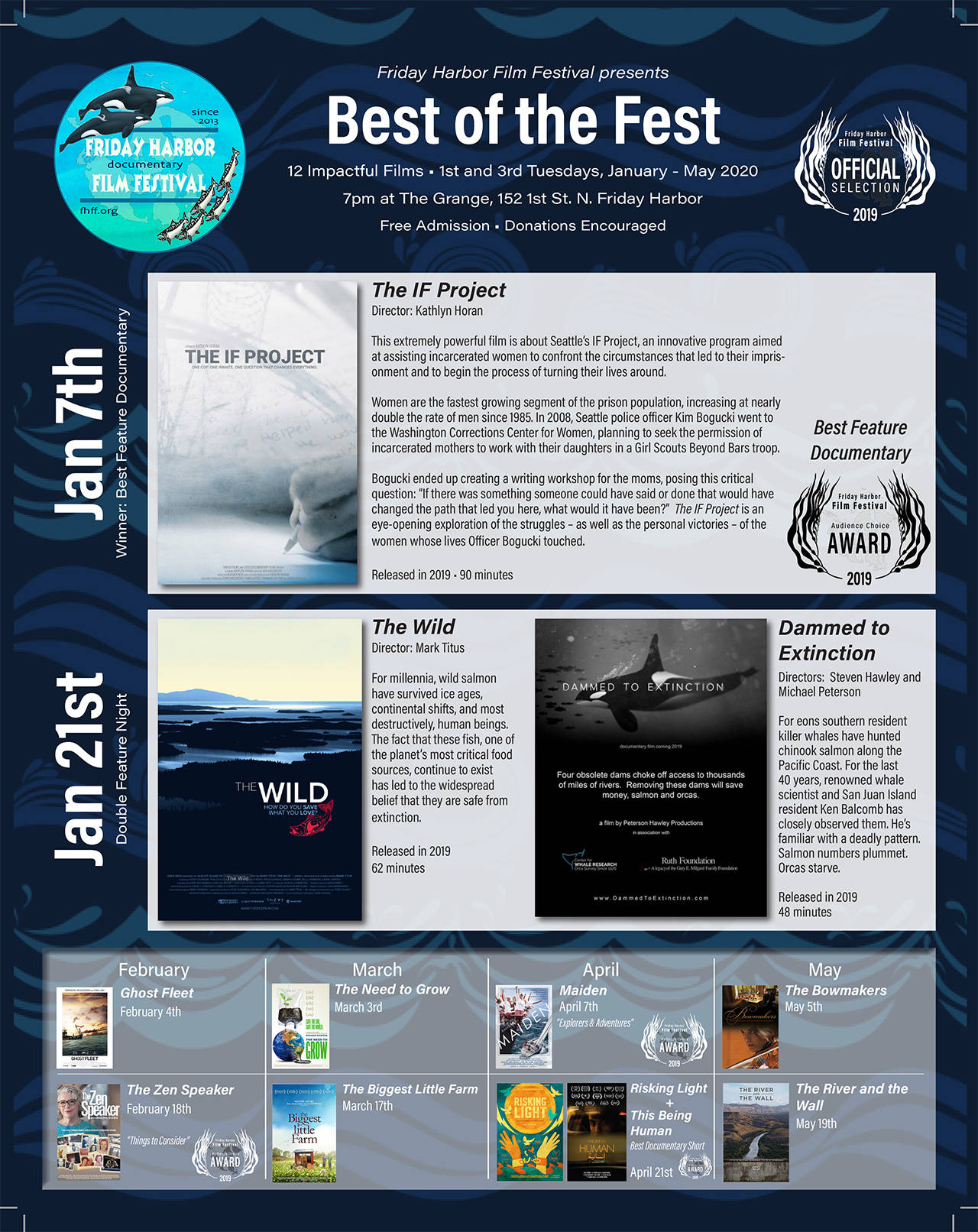Submitted by Friday Harbor Film Festival
Friday Harbor Film Festival’s annual “Best of the Fest” series begins Jan. 7. Award-winning, impactful feature films and shorts from the 2019 Festival will be shown every first and third Tuesday from January through May at the Grange beginning at 7 p.m. These screenings are free, although donations are encouraged.
The line-up includes:
• Jan. 7 – “The IF Project,” Best Feature Documentary. This extremely powerful film is about Seattle’s IF Project, an innovative program aimed at assisting incarcerated women to confront the circumstances that led to their imprisonment and to begin the process of turning their lives around.
Women are the fastest-growing segment of the prison population, increasing at nearly double the rate of men since 1985. In 2008, Seattle police officer Kim Bogucki went to the Washington Corrections Center for Women, planning to seek the permission of incarcerated mothers to work with their daughters in a Girl Scouts Beyond Bars troop.
Bogucki ended up creating a writing workshop for the moms, posing this critical question: “If there was something someone could have said or done that would have changed the path that led you here, what would it have been?” “The IF Project” is an eye-opening exploration of the struggles – as well as the personal victories – of the women whose lives Officer Bogucki touched.
• Jan. 21 – Double Feature Night, “The Wild” and “Dammed to Extinction.”
“The Wild,” For millennia, wild salmon have survived ice ages, continental shifts, and most destructively, human beings. The fact that these fish, one of the planet’s most critical food sources, continue to exist has led to the widespread belief that they are safe from extinction.
However, fisherman-filmmaker Mark Titus is not so confident. He set out to document the urgent threat facing the wild salmon runs in Alaska’s Bristol Bay, where there are plans to construct a massive open-pit copper mine in the headwaters of the most prodigious wild sockeye salmon run in the world.
This conflict in Alaska could become a harbinger to a larger, global question: How do we reconcile human separation from the natural world that sustains us — and if we can change course — how do we save what remains? Picking up where “The Breach” (screened at FHFF in 2015) left off, “The Wild” is an urgent call to action, examining what it means to save what we love.
“Dammed to Extinction,” For eons, Southern Resident killer whales have hunted chinook salmon along the Pacific Coast. For the last 40 years, renowned whale scientists and San Juan Island resident Ken Balcomb have closely observed them.
He’s familiar with a deadly pattern. Salmon numbers plummet. Orcas starve. The downward spiral compelled him to realize that studying whales were no longer enough. He needed to act. The orcas need roughly a million salmon a year, but where to find a million fish? The solution is getting rid of four fish-killing dams 500 miles away, on the largest tributary to what was, until it was dammed in the last century, the largest chinook-producing river on earth. Studying whales is science.
Removing dams is politics. Defiantly mixing the two has become the most important work of Balcomb’s career. Meanwhile, the race to extinction for salmon and orcas speeds up, nipping at the heels of the plodding, clumsy pace of political change in the Pacific Northwest, where dams and hydropower are kings.
• Feb. 4 – “Ghost Fleet” takes a close look at Thailand’s fishing industry, which supplies a large portion of the world’s seafood. The country’s giant fishing fleet is chronically short of up to 60,000 fishermen per year, leaving captains scrambling to find crew.
Human traffickers have seized upon the labor shortage, selling captives from across Southeast Asia for a few hundred dollars each. Once at sea, as many as 4,000 men often go months, or even years, without setting foot on land. Beaten, starved, and held in cages, they are forced to work for little or no pay. This eye-opening film follows a small group of activists who risk their lives on remote Indonesian islands to find justice and freedom for the enslaved fishermen.
Bangkok-based Patima Tungpuchayakul, a Thai abolitionist, has committed her life to help these “lost” men return home. Facing illness, death threats, corruption, and complacency, Patima’s fearless determination for justice inspire her nation and the world.
• Feb. 18 – “The Zen Speaker,” Audience Choice Award “Things to Consider.”
• Mar. 3 – “The Need to Grow”
• March 17 – “The Biggest Little Farm”
• April 7 – “Maiden,” Audience Choice Award “Explorers & Adventures.”
• April 21 – Double Feature Night, “Risking Light” and Best Documentary Short “This Being Human.”
• May 5 – “The Bowmakers.”
• May 19 – “The River and the Wall” follows five friends on an immersive adventure through the unknown wilds of the Texas borderlands as they travel 1200 miles from El Paso to the Gulf of Mexico on horses, mountain bikes, and in canoes.
As the threat of new border wall construction looms ahead, conservation filmmaker Ben Masters realized the urgency of documenting the last remaining wilderness in Texas. He recruited NatGeo Explorer Filipe DeAndrade, ornithologist Heather Mackey, river guide Austin Alvarado, and conservationist Jay Kleberg to join him on a two-and-a-half-month journey along the U.S.-Mexico border.
They set out to document the borderlands and explore the potential impacts of a wall on the natural environment, but as the wilderness gives way to the more populated and heavily trafficked Lower Rio Grande Valley, they came face-to-face with the human side of the immigration debate and entered unchartered emotional waters.



